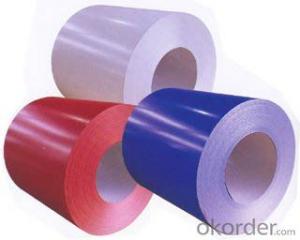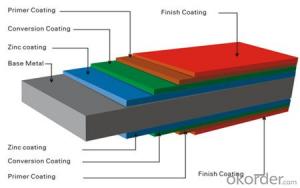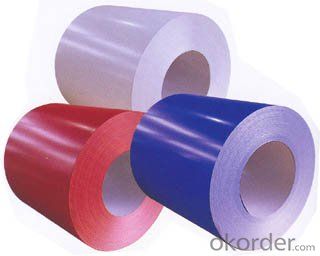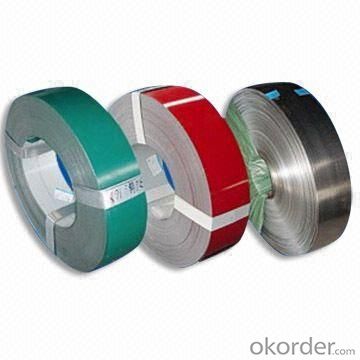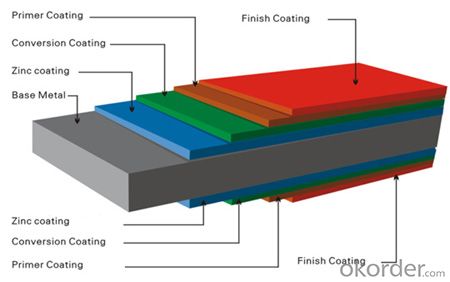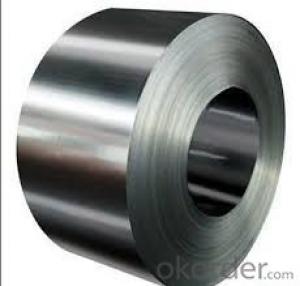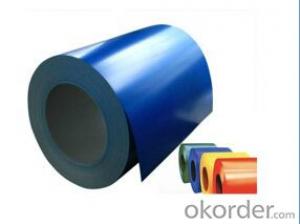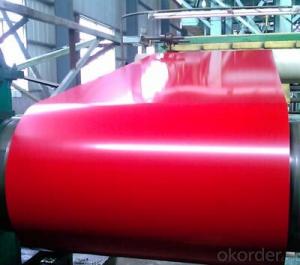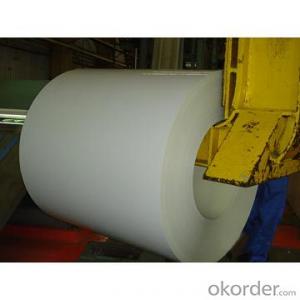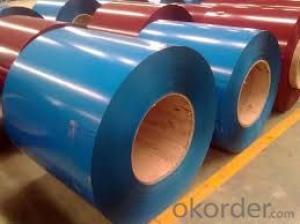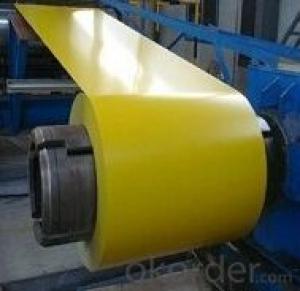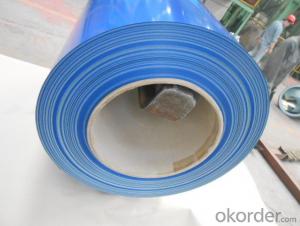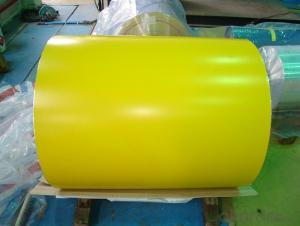PPGI Prime steel coils Any Color you want
- Loading Port:
- Shanghai
- Payment Terms:
- TT OR LC
- Min Order Qty:
- 50 m.t.
- Supply Capability:
- 100000 m.t./month
OKorder Service Pledge
OKorder Financial Service
You Might Also Like
Quick Details
| Standard: | AISI,ASTM,DIN,JIS | Grade: | steel | Thickness: | 0.17-1.5mm |
| Place of Origin: | China (Mainland) | Brand Name: | CNBM | Model Number: | SGCC Q195L, Q235, DX51D |
| Type: | Steel Coil | Technique: | Hot Rolled,hot dip | Surface Treatment: | Coated |
| Application: | Flange Plate | Special Use: | Steel | Width: | 600-1250mm |
| Length: | 2000-6000mm |
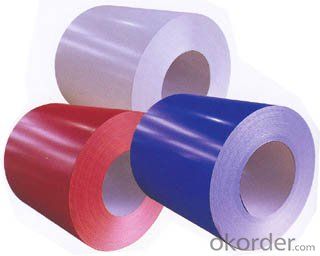
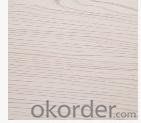
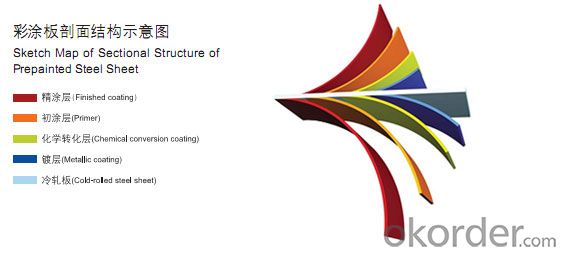
| Commodity | Prepanited steel coil |
| Grade | JIS G3302(SGCC), DX51D, EN10142, GB/T2518-2004, ASTM 653 |
| Standard | ASTM, AISI, DIN, GB |
| Types | Commercial / Drawing / Deep Drawing / Structural quality |
| Width | 500/650/726/820/914/1000/1200/1219/1220/1250mm |
| Thickness | 0.17-1.5mm (0.14-0.5mm is the most advantage thickness) |
| Type of coating | Galvanized |
| Zinc / PE coating | Z60-275g/m2 ,12-25μm(top)/5-10μm(bottom) |
| Surface | RAL System as per customers request |
| ID coil | 508mm |
| Coil weight | 4-6MT or as buyer request |
| Package | Properly packed for ocean freight exportation |
| Application | Industrial panels, roofing and siding for painting |
| Payment terms | 30%TT in advance+70% TT or irrevocable 100%L/C at sight |
| Delivery time | 25 days after recepit of 30% TT or L/C |
FAQ
We have organized several common questions for our clients,may help you sincerely:
1)How to guarantee the quality of the products?
We have established the international advanced quality management system,every link from raw material to final product we have strict quality test;We resolutely put an end to unqualified products flowing into the market. At the same time, we will provide necessary follow-up service assurance.
2)How long can we receive the product after purchase?
In the purchase of product within 20-25 days, we will arrange the factory delivery as soon as possible. The pacific time of receiving is related to the state and position of customers. Commonly 15 to 30 days can be served.
- Q: What is the AISI grade of mild steel that is the most magnetic? What magnetic steels are the cheapest and easiest to buy?
- From what I understand, the best material for cores is not the most magnetic but the rather the one having less loss due to hysteresis,
- Q: What are the different methods of tempering steel coils?
- There are several methods of tempering steel coils, including air tempering, oil tempering, salt bath tempering, and induction tempering. Each method involves heating the steel coils to a specific temperature and then allowing them to cool slowly to achieve the desired level of hardness and toughness. Air tempering involves exposing the steel coils to ambient air for gradual cooling, while oil tempering involves immersing them in heated oil. Salt bath tempering involves placing the coils in a bath of molten salt, and induction tempering uses electromagnetic induction to heat the coils. The choice of tempering method depends on the specific requirements of the steel and the desired properties of the final product.
- Q: Can steel coils be cut to length?
- Yes, steel coils can be cut to length.
- Q: I am buying a knife for my future husband for his wedding gift and I was wondering what is better carbon steel or stainless steel?
- Are you going to use it and take care of it? All butchers use the high carbon steel blades. If you want something to shine real pretty then go with the stainless.
- Q: How are steel coils used in the production of agricultural machinery parts?
- Steel coils are used in the production of agricultural machinery parts as they provide a durable and strong material for manufacturing components such as plow blades, tiller tines, and harvesting machine components. The steel coils are typically cut, shaped, and welded to create the necessary parts that can withstand the harsh conditions and heavy-duty operations involved in agricultural activities.
- Q: What are the different certifications required for steel coil manufacturers?
- There are several certifications that steel coil manufacturers may be required to have in order to operate in the industry. These certifications ensure that the manufacturers meet certain quality and safety standards. One of the most common certifications is the ISO 9001 certification, which is an international standard for quality management systems. This certification demonstrates that the manufacturer has implemented processes and procedures to consistently meet customer and regulatory requirements. Another important certification is the ISO 14001 certification, which is an environmental management system standard. This certification shows that the manufacturer has effective environmental management practices in place and is committed to minimizing their environmental impact. In terms of safety, manufacturers may be required to have certifications such as the OHSAS 18001 or ISO 45001 certifications, which are standards for occupational health and safety management systems. These certifications indicate that the manufacturer has implemented processes and controls to ensure the health and safety of their employees and stakeholders. Additionally, manufacturers may need certifications specific to the steel industry, such as the American Institute of Steel Construction (AISC) certification. This certification is specific to structural steel fabrication and erection and ensures that the manufacturer follows industry best practices. Furthermore, manufacturers may also need certifications related to specific product standards, such as the American Society for Testing and Materials (ASTM) certification. This certification ensures that the manufacturer's products meet specific quality and performance requirements. It is important for steel coil manufacturers to obtain these certifications as they provide credibility and assurance to customers that their products are of high quality, environmentally responsible, and meet industry standards.
- Q: who, when and where was dual phase steel invented?
- Dual Phase steels refers to a distinct group of alloys which are used for automotive bodies. These were developed to give improved deep drawing (for shaping) and strength while on the road. Most of the work was started at the same time in the 1970s as a response to the oil crisis (history repeats!) with SSAB in Europe, US Steel and British Steel leading the way. There are many variants of the dual phase alloys prefered by each of the auto manufacturers. The work on these steels led the way for TRIP (transformation induced plasticity) steels, rephosphorised steels and HSLA (high strength low alloy) steels. There is a distinction between these steels and duplex steels which typically refer to austenitic/ferrtic stainless steels. Also be aware that everyday low carbon steels with 0.1%-0.6% carbon will have a ferritic/pearlitic structure but are not considered to be dual phase So to summarise: Who - major steel companies worldwide When - from about 1973 onwards (up to around 1977 when the developments went in other directions) Where - Europe, USA and Japan (but I'm not sure who it was in Japan doing the work)
- Q: If i get a samurai sword made of carbon steel, what is the hardest thing i can hit before it breaks? Or will it not break?
- Real katanas need regular maintenance, they rust easily and dull quickly. If you get a replica chances are it will break the first time you hit anything with it. If you can find one, the WW2 officers swords were of good quality and the modern metals mean it doesn't rust or dull as easily. If you do insist on getting a carbon steal blade be ready to oil it often. It will rust at the mention of moisture.
- Q: How do steel coils contribute to the construction equipment industry?
- Steel coils play a crucial role in the construction equipment industry by providing the necessary raw material for manufacturing various construction machinery and equipment. These coils, made from high-quality steel, are used in the fabrication of a wide range of construction equipment, such as cranes, bulldozers, excavators, loaders, and forklifts. The primary contribution of steel coils to the construction equipment industry lies in their structural strength and durability. Steel is known for its excellent mechanical properties, including high tensile strength, toughness, and resistance to wear and corrosion. These qualities make it an ideal material for constructing heavy-duty machinery that can withstand the demanding conditions of construction sites. Steel coils are used to manufacture the structural components of construction equipment, such as chassis, frames, booms, buckets, and attachments. These components need to be robust and able to withstand heavy loads, impacts, and constant use. Steel coils provide the necessary strength and reliability to ensure the longevity and performance of construction equipment. Furthermore, steel coils are also used to fabricate specialized parts and accessories for construction machinery. These include hydraulic systems, gears, shafts, bearings, and fasteners. These components are crucial for the proper functioning and efficiency of construction equipment, and steel coils provide the high-quality material needed to manufacture them. In addition to their mechanical properties, steel coils also contribute to the construction equipment industry through their versatility and customization options. Steel can be easily shaped, cut, welded, and formed into various shapes and sizes, allowing manufacturers to create equipment with specific designs and functionalities to meet the diverse needs of construction projects. Overall, steel coils are indispensable in the construction equipment industry as they provide the foundation for robust and reliable machinery. Their strength, durability, and versatility make them an essential raw material for manufacturing construction equipment that can withstand the rigors of the construction site and ensure the safety and efficiency of construction projects.
- Q: ...particularly for jewelry?
- Surgical stainless steel is a variation of steel usually consisting of an alloy of chromium (12–20%), molybdenum (0.2–3%), and sometimes nickel (8–12%). The chromium gives the metal its scratch-resistance and corrosion resistance. The nickel provides a smooth and polished finish. The molybdenum gives greater hardness, and helps maintaining a cutting edge. In metallurgy, stainless steel (inox) is defined as a ferrous alloy with a minimum of 10% chromium content.[1] The name originates from the fact that stainless steel does not stain, corrode or rust as easily as ordinary steel. This material is also called corrosion resistant steel when it is not detailed exactly to its alloy type and grade, particularly in the aviation industry
Send your message to us
PPGI Prime steel coils Any Color you want
- Loading Port:
- Shanghai
- Payment Terms:
- TT OR LC
- Min Order Qty:
- 50 m.t.
- Supply Capability:
- 100000 m.t./month
OKorder Service Pledge
OKorder Financial Service
Similar products
Hot products
Hot Searches
Related keywords
